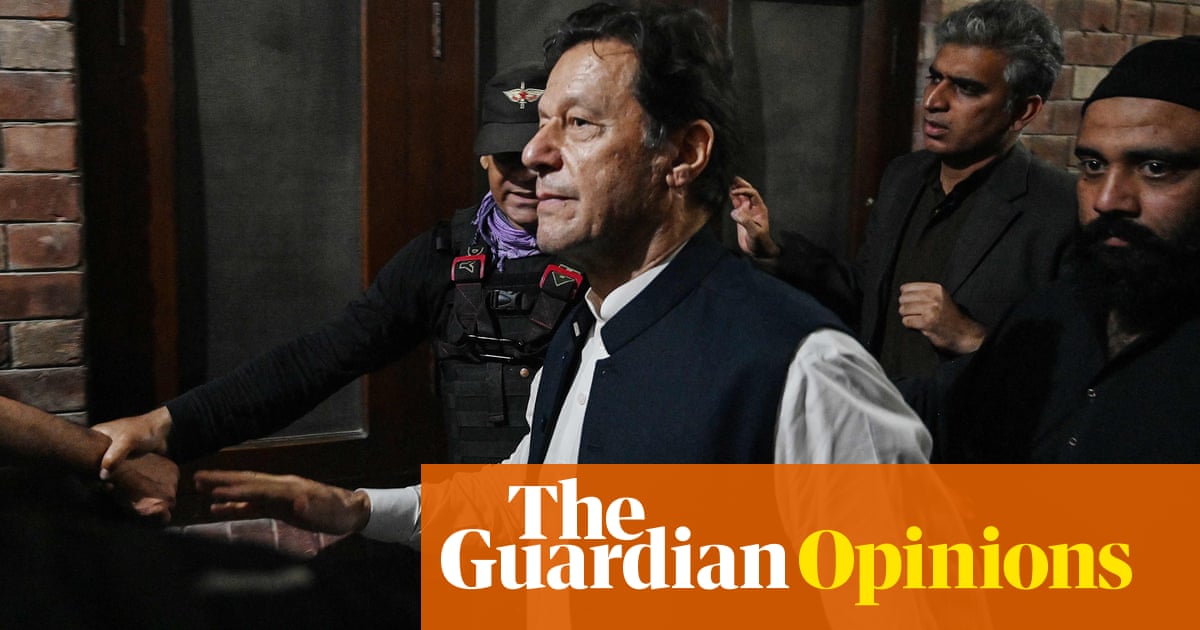
The arrest of former prime minister Imran Khan on charges of corruption has sent shock waves throughout Pakistan and the wider world, raising the prospect of an imminent disintegration of the country’s fragile social and political fabric.
For many, however, it also speaks to a well-established tradition: the incarceration of political leaders who fall foul of the country’s all-powerful military.
Khan’s long list of predecessors in this category include former prime ministers Nawaz Sharif, Benazir Bhutto and Pakistan’s first freely elected prime minister, Zulfikar Ali Bhutto; all spent extended periods behind bars. For some, detention ended with tragedy. Zulfikar Ali Bhutto was hanged in 1979 by a military dictatorship after a controversial trial; his daughter, Benazir Bhutto, was assassinated in 2007 just weeks after enduring house arrest under the orders of another military regime.
It is no wonder that many now fear for the fate of Imran Khan.
Those fears have been compounded by allegations of an assassination plot, whose mastermind is said by Khan to be a serving army general and senior intelligence officer. Nicknamed “Dirty Harry” by Khan – a reference to Clint Eastwood’s rogue police officer – he is accused of conspiring with the current prime minister, Shehbaz Sharif, and his interior minister to kill Khan during a rally in Punjab province in November 2022 when gunmen opened fire and injured Khan. These allegations have been strongly denied and termed “false and cheap conspiracies”.
After the attack, Khan demanded the immediate resignation of the alleged plotters and a full investigation; he also claimed to have “sniffed out” another assassination attempt. But at a rally last week Khan claimed that his calls for an inquiry were being thwarted by “one powerful man” – Dirty Harry – whom he identified as Maj Gen Faisal Naseer of the Inter-Services Intelligence (ISI), the country’s powerful spy agency.
Within hours, the army’s media wing, the Inter-Services Public Relations (ISPR), hit back. In an angry statement, it denounced Khan’s “irresponsible and baseless” allegations against a serving military officer and deplored them as “unacceptable”.
Khan’s reaction, which came just hours before his arrest, pulled no punches. In a stinging rebuke, he called on the ISPR “to listen to me carefully” and warned that he was ready to die to foil the plot hatched by “Dirty Harry”. In a pre-recorded video released after his arrest, he also urged people “to come out” in protest.
The latest developments represent an extraordinary turnaround in the fortunes of Khan, whose rise to power had been widely favoured by the military. Khan himself made no secret while in office of being on the same page as the military.
But this once cosy relationship foundered in late 2021 amid acrimonious differences over the appointment of the head of the ISI. Khan’s attempt to ensure his preferred candidate, Gen Faiz Hameed, continued in the post – in preparation, it was said, to take over as army chief – was met with stiff resistance.
Speculation that relations between the two sides had been irreparably damaged was confirmed after the army high command let it be known that it would remain “neutral” in the run-up to the vote of no-confidence against Khan in April 2022. It triggered a furious response from Khan, who declared that, while “humans acted in accordance with their conscience … only animals were neutral”.
The contradictions of this so-called hybrid regime are, however, still to play out. In 2019, for instance, Khan cut short the tenure of the then spy chief, Gen Asim Munir, who was said to be investigating allegations of corruption against Khan and members of his family. Munir was replaced by Khan’s confidant, Hameed. But in a dramatic reversal in November 2022, Munir was named head of the army, placing him, arguably, in pole position to determine Khan’s fate.
Khan’s popularity, which had slumped in the weeks before his removal, has soared. Few doubt that he would return to power, when or if elections were held. Public dissatisfaction with the incumbent coalition government and its failure to address Pakistan’s economic crisis, which has left the country staring at sovereign default, have also helped boost Khan.
Munir also faces credible reports of serious splits within state institutions, which are said to be divided in their support for Khan. They include the judiciary, where Khan’s repeated success in securing bail in more than 100 cases registered against him has led to claims of judicial bias.
More ominous still are the faultlines within the army itself. There are reports of widening divisions between a military high command hostile to Khan and the rank and file, who support him. There have also been public expressions in favour of Khan by senior ex-servicemen, who have emerged as vocal critics of the current military leadership.
For the people of Pakistan, the current moment serves as further proof of the abject failure of their leaders to set aside their egos, resume political dialogue and restore the morale of a broken country.
Farzana Shaikh is associate fellow in the Asia-Pacific Programme at Chatham House












